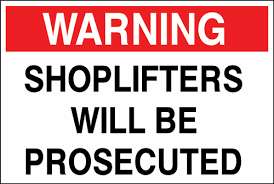Michigan Retail Fraud: Here’s What You Need to Know
 The five-finger discount is probably as old as retail stores, but in Michigan, it is no laughing matter. Retail fraud – shoplifting – is considered a very serious crime with serious consequence. If you have been charged with retail fraud, no matter the degree, you should treat it as a serious matter and seek competent defense counsel as soon as possible.
The five-finger discount is probably as old as retail stores, but in Michigan, it is no laughing matter. Retail fraud – shoplifting – is considered a very serious crime with serious consequence. If you have been charged with retail fraud, no matter the degree, you should treat it as a serious matter and seek competent defense counsel as soon as possible.
First, it’s helpful to know how the law defines retail fraud. The typical shoplifting scenario is certainly included, but the statute also criminalizes changing the price tag on an item or otherwise misrepresenting the cost of the item as to pay less for the item. Retail fraud also includes seeking store credit or a refund for items that were not purchased or was not from the store. Charges range from first degree to third degree, with first degree covering fraud of $1,000 or more. Third degree charges cover fraud below $200. Remember, that attempting to commit retail fraud will land you in as much hot water as actually committing retail fraud. Indeed, it is possible to be charged with both attempted retail fraud and retail fraud.
Second and third degree retail fraud clock in as misdemeanors, but still carry a hefty penalty including jail time and fines. Fines for second degree fraud top off at $2,000 and fines for third degree top off at $500. First degree retail fraud is a felony and is punished as one. A person convicted of first degree retail fraud faces jail time of up to five years and a potential fine of $10,000. If someone has been convicted of retail fraud before, a third degree charge can get bumped up to a second degree charge even if the value of the item is below $200.
Another mistake that many who are charged with retail fraud make is to assume that a misdemeanor is no big deal. Even a misdemeanor conviction on your record can make life more difficult. For example, oftentimes employers ask if a person has been convicted of any crime – felony or misdemeanor. If you have been convicted of retail fraud, you must disclose this on the employment application or face even worse consequences.
The conviction will show up on background checks. Since anyone with a credit card and enough personal information can order one from the comfort of their living room, it is even more critical that you do everything possible to avoid getting a conviction. Financial institutions may ask for this information as well to determine if you are an acceptable credit risk for loaning money. You may have a particularly difficult time if you decide to get a professional license at some point in the future. Convictions must be disclosed here as well and a retail fraud conviction may be particularly damaging as it involves theft.
Theft in general is considered a crime of dishonesty in that there is an intent to deceive to gain an advantage. Under the Michigan Rules of Evidence, a conviction for retail fraud can be used against you in other proceedings to attack your credibility as a witness.
The ripple effect of a conviction cannot be underestimated which is why it is incredibly important to recognize the seriousness of the charges from the minute they are filed. This means that the first step you should take is to contact an attorney who is knowledgeable and ready to assist you to minimize the potential consequences of the charges. Michigan Gun Law is that kind of firm and is ready to help you. Call us today to get started.
